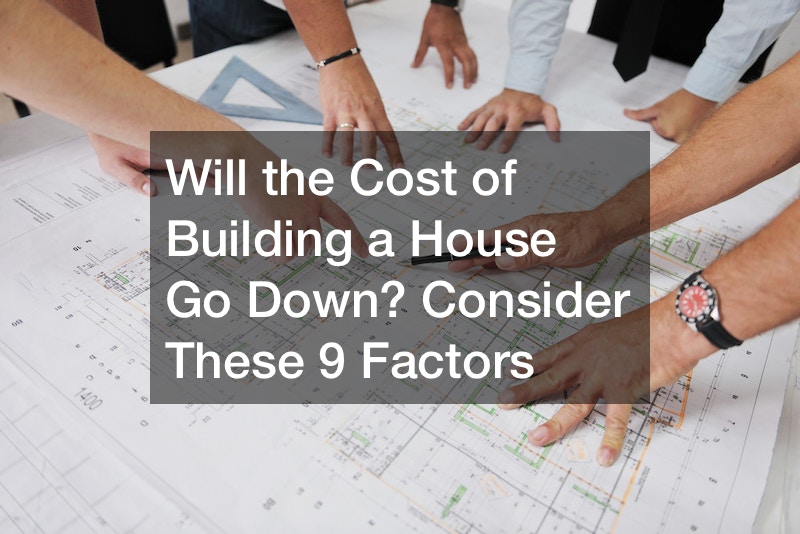

Building a home is something that many people hope to be able to do at some point in their lives. This takes planning and a lot of hard work, but it’s doable. If you’re already at the point where you’re ready to work on your plans, it’s a good idea to look for good home building companies. You can start your search online by looking for something like a home-building planner or something along these lines. Some specific terms you can search include “custom homes under 500k” or “house-to-home construction.”
Read up on the process so that once you find an expert you want to work with, you can communicate easily. This is because when you’re familiar with some of the terms you may come across during the project, it will be a lot faster for you to move from one stage to the next. If you’re looking for custom home lots for sale, you can also find some worthwhile leads online. This will save you a lot of time, but it’s crucial to do your due diligence so that you’re not likely to get scammed. This is generally a costly project, so it’s understandable that you stand to lose a lot of money if you’re not careful.
If you’re looking to buy a home, you’re probably wondering, “When will the cost of building a house go down?” According to a 2020 report by Renofi, U.S. housing prices have increased by 48.55% in the last decade. As a result, people have to dig deeper into their pockets to own their dream homes.

The rising housing prices are driven by several factors affecting house construction and ownership costs. These factors can tell you which direction the wind will blow in the coming months and years. So, if you’ve any aspirations of building or buying a home, below are the top considerations you should make.
1. The Labor Costs
Labor is vital to building a house – you need several experts, including architects, general contracting professionals, plumbers, electricians, roofing contractors, etc. Therefore, a big part of your construction budget will go toward labor costs. In some projects, these costs can account for up to 50% of the total building costs. Therefore, if you’re asking, “Will the cost of building a house go down?’ labor costs are one of the factors you’ll have to look closely at.
The cost of building a home can also be affected by several factors that influence the cost of labor, such as rising wages. For example, according to Construction Drive, the hourly salaries of construction workers increased by 6.1% in 2022. While this was good for the workers, it also increased construction costs, making building or buying homes more expensive.
Labor costs can also vary from one location to another and depending on the type of construction workers you hire – and their experience. For example, some states have higher average pay for construction workers. Likewise, wages for commercial builders will also differ from those of residential workers – this can affect construction (and house ownership) costs of properties such as large apartment complexes.

2. Construction Materials
Like labor, materials comprise a considerable portion of the total construction costs. As a result, an increase or decrease in the price of materials will significantly impact the cost of building or owning a home. Therefore, if you’re asking, ‘Will the cost of building a house go down?’ you should start paying attention to the cost of materials.
According to the National Association of Home Builders, the cost of materials has been rising in recent years, making housing less affordable. The high prices are because of several factors, including inflation, taxes, rising production costs, political factors, etc. In addition, supply shortages caused by a disruption in the supply chain have led to high materials prices and delays, leading to increased housing construction costs.
However, all is not bleak when it comes to construction materials costs. According to a report by For Construction Pros, the prices of various materials are expected to decrease in the coming years. This is because of factors such as a reset in the global supply chain, ease in the demand for materials, reduction of global fuel prices, and economic recovery. Consequently, this can make building or buying a house more affordable.
3. The Location
Nearly everyone looking to build or buy a home will want a ‘good’ location. However, according to a study published in Research Gate, location is a top factor affecting housing prices. Therefore, if you’re wondering, ‘Will the cost of building a house go down?’ the location is another vital aspect to pay attention to.
One way location affects property is in the value of land and property. For example, you can expect to pay more when building or buying a city home than in a rural area. Additionally, regional differences can have a massive impact on land and property value. For example, according to the Las Vegas Review Journal, Las Vegas housing prices increased by more than double between 2011 and 2018, which was way higher than the national average.
The location of a home can also affect the housing price in several hidden ways. For example, some regions and localities might have more expensive licensing fees, homeowner association fees, etc. Another way location can affect your home ownership costs is through relocation fees – household moving services can be pretty pricey when moving to a distant place.
4. The Construction Site
The site is another essential factor to consider if you’re wondering, ‘When will the cost of building a house go down” According to The Constructor, several site-related issues can affect building construction. These include poor weather, remote location (making materials delivery difficult), waste disposal issues, availability of utilities, etc. These factors can drive up construction costs in many ways – for example, delays – making it more expensive to build a home.
The condition of the site can also have a significant impact on housing prices. For example, poor soil conditions will need more stabilization to make your building safe, which can increase construction costs. Other factors, such as land clearing costs, can cause your building budget to balloon.
The site can also affect housing prices if you’re looking to buy a home. Physical attributes of your property, such as space for expansion, poor drainage, access to amenities, trees, etc., can affect its value and the rate at which a property appreciates over time. Therefore, the site is another vital consideration when buying a home.

5. The Type of House
Before you build or buy a home, of the top considerations you’ll have to make is the type of house you want. Your decision on this area will significantly affect the construction or purchase costs. Therefore, if you’re asking, “Will the cost of building a house go down?’ consider the type of property you want to build or buy.
One of the ways that housing prices differ across various types of homes is in the construction costs incurred. For example, the price of building or buying a single-family home will be higher compared to the unit price of a townhouse, condominium, or mobile home.
If you’re considering buying a home, your choice of a house can also affect your mortgage. According to the Mortgage Reports, different types of property can have different mortgage rates, which can significantly affect the price of your loan.
Lastly, housing prices can vary between property types due to changing real estate trends. For example, mobile homes are becoming increasingly popular, driving their demand and cost. Therefore, if you plan on hiring a manufactured home realtor in the coming years, you might have to pay a little more to own a home.
6. Interest Rates
According to HomeLight, around 78% of Americans require financing to buy a house. Likewise, many aspiring homeowners have to take a loan to finance the construction of their homes. These loans come with interest rates, which can significantly affect housing costs. Therefore, if you’re asking, ‘When will the cost of building a house go down?’ you should start looking at the interest rates.
According to the National Association of Home Builders, the rising interest rates on construction loans are pushing construction costs upwards, making it more expensive to build new homes. A hike in interest rates can also limit home builders’ funding availability, causing costly construction project delays. Unfortunately, these effects are pushed onto homebuyers, who also have to pay more to buy a home.
The real estate market has also been heavily affected by rising mortgage rates. Many home buyers now have to pay more for their homes due to sharp hikes in interest rates, which has led to a decline in housing affordability.
According to Investopedia, interest rates can also affect the supply and demand for housing, which can, in turn, affect housing costs. For example, rising interest rates can decrease the availability of capital to housing investors, leading to a shortage of homes, which can drive up prices. On the other hand, rising mortgage rates can reduce the number of home buyers, easing the demand for housing and, consequently, causing the price of properties to fall.

7. Property Management Fees
Property management can be a vital tool that can offer you an easy time when constructing or buying a home. However, it’s also an added expense, which can influence the housing price. Therefore, property management fees are another top factor you should consider if you’re planning to build or buy a home in the coming years.
During the construction phase, many home builders will higher a construction manager to oversee the process – which means extra labor costs. Additionally, most housing investors use a property manager to manage the construction, leasing, or selling phases, which can further drive up building costs.
Housing management fees can also affect the cost of buying a home. According to a study published in CORE, houses sold through realtors and brokers often attract a higher price. This is because most sellers also factor in the commission in the listing price, thus passing it on to the buyers.
However, using property managers can also positively influence housing prices. For example, a manager can help avoid delays and material wastage during construction, decreasing construction costs. Likewise, when buying a home, using a real estate agent can help you land a better deal, saving you money.
8. Insurance Rates
Insurance is vital whether you want to build a home or buy one. However, it can also have a massive influence on housing prices. Therefore, it is another factor you’ll need to pay attention to before you make a decision.
When building a home, you need various types of insurance, such as builder’s risk, indemnity, and third-party insurance. These can help to cover you against any losses that may be suffered during the construction phase. However, they are also an added expense, which drives up the building costs.
According to Construction Executive, the building industry has also been experiencing rising insurance premiums in recent years. This has further led to increased construction costs, making it more expensive to build homes. Likewise, homeowners insurance premiums have been rising steadily in recent years, making it more costly to buy a home.
So, will the cost of building a house go down soon, given the rising insurance rates? While the high premiums are a source of concern, there’s a bit of hope. This is because factors such as inflation and increased materials costs are projected to ease up in the coming years. Consequently, this will help reduce insurance rates, making homes more affordable.

9. The Prevailing Economic Conditions
According to SFGATE, the economy is one of the top factors influencing the housing market. A strong economy will lead to considerable gains in the market, while a weak one can cause the industry to suffer. Therefore, if you are asking, ‘When will the cost of building a house go down? you should look at the current economic conditions.
Economic factors can significantly impact the housing price when building or buying a home. For example, a weak economy causes decreased income, inflation, reduced industry confidence, difficulty accessing loans, and high interest rates. These issues can drive up construction costs and housing prices.
On the other hand, a strong economy leads to higher incomes, low inflation rates, low-interest rates, easier time borrowing money, and increased confidence in the housing market. This helps to lower the costs of building and owning a home.
However, the housing market can also operate differently than expected during strong and weak economic conditions. For example, a strong economy increases buying power, causing many people to seek out homes for sale. This increased demand for housing can lead to a shortage, driving up the cost of buying a home.
On the other hand, in a poor economy, the decreased buying power can lead to less demand for housing, causing the price of homes to fall. Additionally, increased interest rates can cause many homeowners to default on properties, causing an increase in foreclosed homes, which are often sold at discounted prices.
Homeownership is becoming more challenging due to rising construction costs and housing prices. However, by observing the market, you can tell which direction it’s headed, which can help you prepare to either build or buy a home. Therefore, if you’re wondering, ‘When will the cost of building a house go down?’ the above are some of the top factors you should consider.



